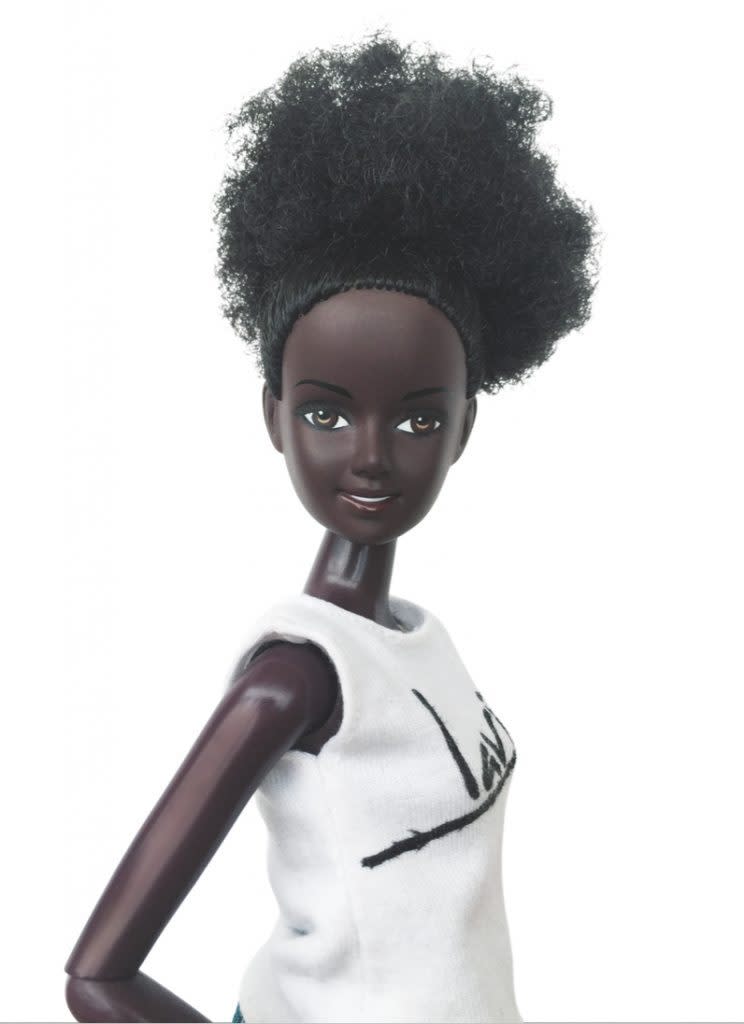Doll Creator Fires Back After Critic Calls Her Toys ‘Too Dark’

Until recently, children’s dolls often didn’t reflect the diversity of the kids who played with them. But thanks to the efforts of several manufacturers — including Mattel, which launched new Barbie dolls with seven different skin tones, as well as a range of body types, last January — there are more dolls than ever that reflect real-world diversity.
Mala Bryan is one of those doll manufacturers. Her Malaville line is comprised of four stunning dolls that come in several different shades of brown, each with her own backstory, including career and hobbies. “I personally am a doll collector and felt the need to create something I felt was missing in my collection and also something I felt other doll collectors and lovers (both adults and children) would love to add to their collection,” she wrote on her website.
But not everyone is a fan. One customer, C. Lincoln, commented on Bryan’s Maisha doll, which has the darkest complexion of the four, writing, “I think that one doll [Maisha doll] is a bit too dark. That’s like the Sudanese doll. I think it’s safe to say that’s the least bestselling. … Keep the other three and create accessories etc. Keep doing what you do, sistah.”
In response, Bryan shared the comment on her Instagram with another customer’s powerful message: “I don’t believe that a doll can be too dark…Black in all shades is indeed beautiful and that’s what Mala Bryan is trying to communicate to the world. Alek Wek, a Sudanese model, is (according to her own words) ‘as black as the night’ and she can be seen on the biggest runways in the world. I don’t think it’s safe to say that’s the least best selling doll. #CelebrateHumanity.”
Bryan wrote that she first thought about ignoring the ignorant comment. “But I’m sharing just so that people realize that our super dark people must still be facing a huge problem,” she wrote. “This is just sad. Although I got a compliment at the end, the person had the nerve to talk about [Maisha] being the least selling when she actually my second best selling.”
Several Instagram users voiced their disappointment that someone would think a doll wouldn’t sell well simply because of its dark skin tone — the ‘too dark’ comment echoing the societal and cultural pressures that many girls and women with dark skin tones face to lighten their complexion — while others shared their support of Bryan making a doll like Maisha. User toylsan wrote, “Damn people still try to devalue the melanin,” while chapaquente423 commented, “I bought 2 of each and my daughter’s favorite is the darkest one.” Instagram user del_aine wrote, “I think the doll is beautiful, just like all dark skin peoples.”
A photo posted by Malaville Toys (@malavilledolls) on May 2, 2016 at 4:03am PDT
What Bryan and other doll manufacturers are doing — creating dolls that reflect a beautiful array of skin tones — is important. Maria Pilar Bratko, a family therapist and clinical director of the Women’s Therapy Center in Berkeley, Calif., told Parents that dolls that mirror a child’s racial identity can help them develop a healthy self-image, and in general, seeing a variety of dolls helps promote a well-rounded world view for all kids. “When parents give a child a doll that looks like her, they’re saying: ‘There are people like you in the world,” said Bratko. “‘You matter just as much as anyone else.‘”
Let’s keep in touch! Follow Yahoo Beauty on Facebook, Twitter, Instagram, and Pinterest.
